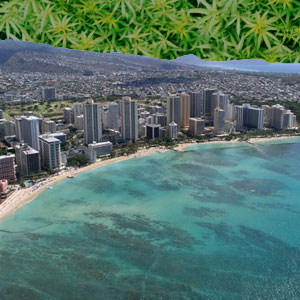A poll released Thursday shows 57% of Hawaiians favor the idea of taxing and regulating marijuana. That’s a startling 20% increase in support in just seven years—a 2005 poll by the same group asking the same question had only 37% support.
The QMark Research poll was conducted for the Drug Policy Action Group and consisted of telephone interviews with 603 respondents. It has a margin of error of +/- 4.07%.
The poll showed 45% strongly supporting tax and regulate, with another 12% saying they had “somewhat strong support.” Only 40% opposed legalization, a figure that has declined by 20 points since the 2005 poll.
The poll also found strong support for decriminalization (58%), for medical marijuana dispensaries (78%), and for the medical marijuana law passed by the legislature in 2000 (81%). The law allows patients to use marijuana, but makes no provision for them to obtain it except by growing it.
The poll numbers were released at a press conference conducted by the Drug Policy Action Group, a sister organization to the Drug Policy Forum of Hawaii, and the ACLU of Hawaii. Also introduced at the press conference was a study (available at the poll link above) by University of Hawaii economist David Nixon on the economic impact of marijuana law enforcement in the state.
Nixon found that Hawaii spends $9 million a year on marijuana law enforcement and foregoes $11 million a year in potential revenues under legalization. He also found that marijuana arrests are increasing in the state, with possession arrests up nearly 50% since 2004 and distribution arrests almost doubling.
“From the survey findings, it’s clear that Hawaii voters are open to reconsidering local marijuana laws,” said the Action Group’s Pam Lichty. “The data in both of these reports will help our communities craft more effective, less costly approaches for the future. The Drug Policy Action Group, the ACLU of Hawaii, and our allies will advocate for the policy reforms that people in Hawaii want.”
“In Hawaii as across the nation, arrests for marijuana possession are one of the most common ways that individuals get caught up in the criminal justice system, at great social and economic cost,” said Vanessa Chong, executive director of the ACLU of Hawaii. These studies provide important, updated facts for the Hawaii community as we consider new directions.”
Article From StoptheDrugWar.org - Creative Commons Licensing – Donate







